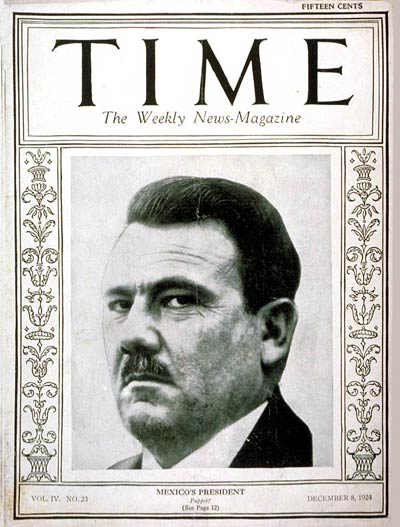 |
|
|
Corrido de la Convención,
narrates the visit on April, 1925 of President Calles to the city of
Jerez, Zacatecas. This corrido relates the festive reception he was
given by the officials and the citizens of the town, expressesing an
entirely pro-government stance. The propositionality of the corrido
is intended to show Calles in a positive light; not a severe and unyielding
authoritarian leader, but rather a benevolent, good-natured President
who wants what is best for the country. This image contrasts sharply
with the historical image of Calles, who had convents and churches closed,
foreign born priests deported, and clergy sentenced to several years
in prison for criticizing the government. Because of actions like these
he is often held responsible for provoking the Cristero rebellion. In
the liner notes of Corridos de la rebelión cristera, Alicia Olivera
de Bonfil offers an explanation for the festive tone of the corrido,
as well as the charming characterization of Calles. She says that even
though Jerez is located in a heavily Cristero region, the people of
this city did not participate in the armed conflict. But in any case,
Calles' good humor is so exaggerated in this corrido that it's hard
to hear it as anything but propaganda. |
|
|
When Calles finally
does arrive, the corrido describes an enthusiastic crowd, a parade in
the city with streamers and elegant flowers. It is when the President
addresses the crowd that we see the idealized portrait of him. He asks
them why they have closed their temple: "-¿para qué
cierran su templo? / sigan con su religión." He then goes
on to tell them that he has not come to take away their beliefs; that
he supports all beliefs, from catholicism to the Masons, and that each
person should believe as he or she wishes. "cada cual crea en lo
que quiera, / hay distintos corazones." He then makes a reference
to the agrarian reform when he tells them: "hay que cultivar la
tierra / que trabaje todo el mundo." In this way he says they will
avoid the outbreak of war. There is one more event that happens in the
corrido that further shows Calles good-natured demeanor. After giving
his speech, the stage collapses. Rather than become angry or indignant,
the President laughs and laughs, once again demonstrating the very human
and non-threatening character of Calles. |
|



